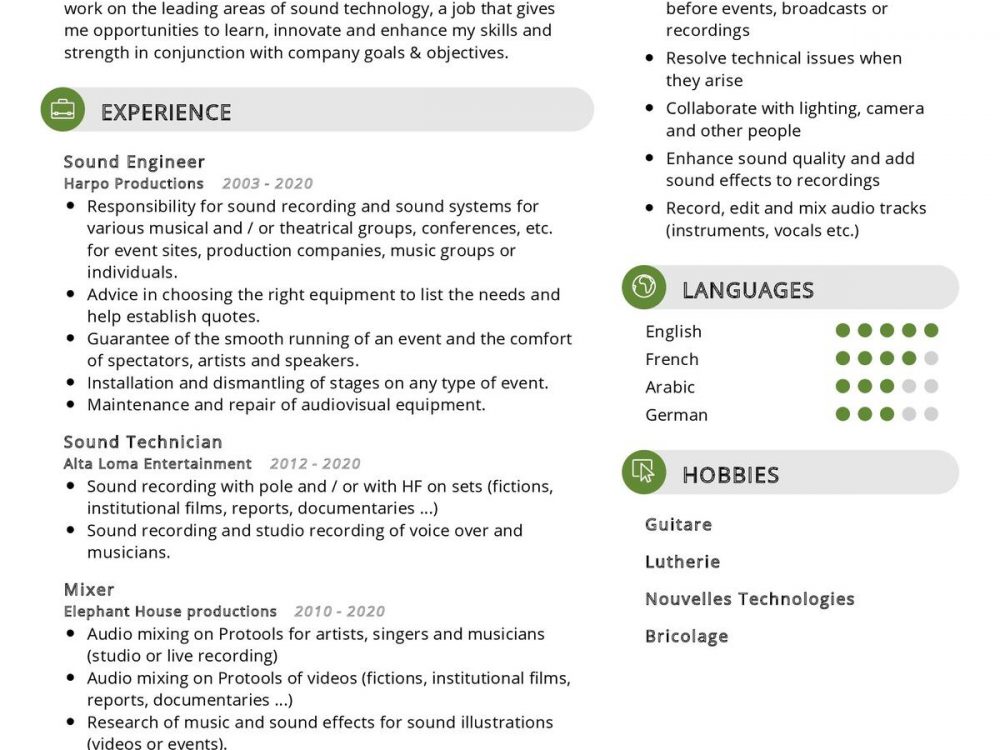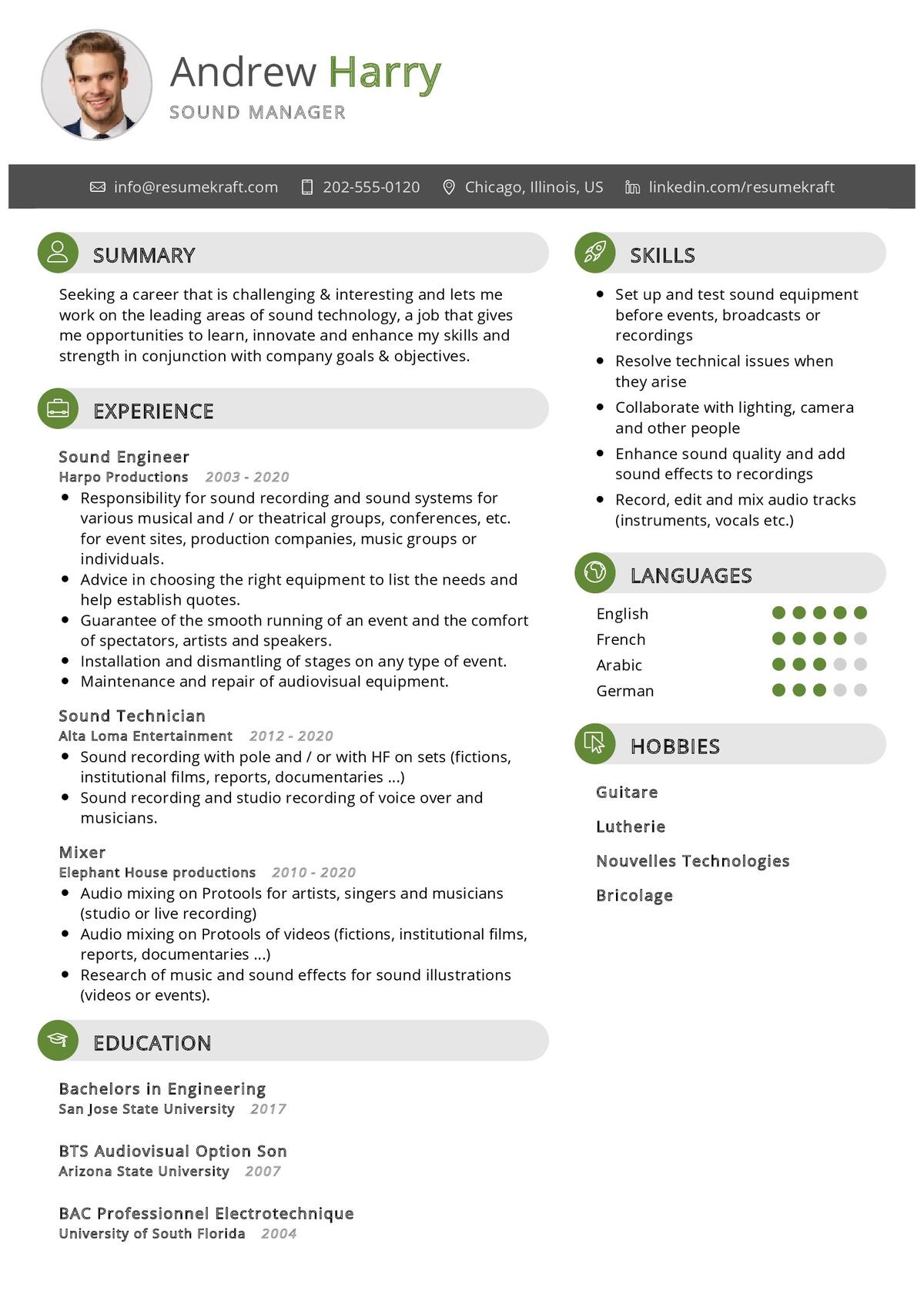Are you a Sound Manager by profession and looking for an exciting career? We have good news for you! use our job-winning professional Sound Manager Resume Sample. You don’t have to start writing from scratch. Just click “Edit Resume” and modify it with your details. Update the template fonts and colors to have the best chance of landing your dream job. Find more resume samples.
Career Expert Tips:
- Always make sure you choose the perfect resume format to suit your professional experience.
- Ensure that you know how to write a resume in a way that highlights your competencies.
- Check the expert curated popular good CV and resume examples
Guide to Write an Effective Sound Manager Resume
If you’re looking to change your career, or make a move in the industry, then you should be writing a Sound Manager resume. The ideal Sound Manager resume is one that highlights your skills in a way that catches employers’ attention. With this basic step-by-step guide and tips from industry professionals, you’ll have no problem crafting the perfect Sound Manager resume for your job hunt.
First, you need to think about what kind of job you want. Be sure to read the job description and write your resume based on keywords in the job posting. Next, you’ll need to know whether or not your resume needs to be classified as a Sound Manager resume. If so, then knowing what enhancements can make it stand out from other resumes will be necessary. And finally, you can start customizing your Sound Manager resume by using the tips included here.
Sound Manager Job Description:
Sound Managers can be hired for a variety of different job positions, including those that allow them to make the most of their skills. They can work in bands, orchestras, choirs, and any other place where music is produced. These professionals should have sound engineering experience and at least two years of experience in the field.
Sound Manager Responsibilities:
- The Sound Manager should be knowledgeable about how to make the most of their time spent at work. They should absolutely be able to stay on top of all projects, track down resources, and protect their own time through attendance requirements.
- Sound Managers need to know how to deal with others in an effective manner. For instance, they should also possess quality customer service skills as well as patience and kindness when interacting with clients or co-workers.
- He is responsible of having an understanding of their organization’s mission statement. They should also be up-to-date on the organization’s goals and objectives, and know-how to align their own work with these priorities.
- He should be able to use collaboration software, such as Microsoft Office Suite, without any problems. They also need to be familiar with all aspects of social media platforms and be able to effectively maintain blog entries or community sites.
- He should know how to prioritize their tasks, which means they also should be able to effectively assign tasks that are required. Research indicates that Sound Managers should know how to use project management software as well.
- Sound Managers need to be able to communicate clearly with others and give detailed directions or feedback during meetings if necessary.
- He should also have excellent interpersonal skills, which is why they will need a high degree of organization and professionalism throughout the day even when not at work.
Tips to Write a Sound Manager Job Summary:
- Your summary should be just a few sentences long and be more focused on skills than experience.
- Focus on three to five major skills that are relevant to the field, but don’t go overboard and make sure to include examples.
- When writing your summary, focus more on describing what you do (your work style) than what you’ve done in the past.
- Resumes that are two to three pages long tend to get noticed over those that are too long or too short.
- Keep it simple. The more you write, the longer it will take to read. Keep your summary as short as possible, which means keep your sentences short and make each one manageable and easy to follow.
10 Top Skills Sound Manager Must have:
- Creativity:
A Sound Manager is known for his work in the music industry, including mixing and producing music artists’ recordings. As a result, Sound Managers should have the creativity to come up with new ideas while working alongside other co-workers. - Attention to Detail:
Sound Managers should be capable of doing well in school since they can work on their small-scale projects at the same time. Along with that, he should have good organizational skills, so that he can work on his tasks when needed. - Interpersonal Skills:
All jobs require some form of communication between co-workers and clients. As a Sound Manager, communication will be a huge part of his job. Not only does he need to be able to deliver messages or assignments, but he should also know how to problem solve and when to ask for help or clarification. - Problem-Solving Skills:
The Sound Manager requires him to be able to think outside the box in terms of how he uses his skills. Anytime there is a problem, he should always try to come up with solutions that are unique and not too easy for anyone else. - Project-Based Work:
When completing tasks, Sound Managers should always be able to work with a clear goal in mind. He should also quickly identify potential obstacles to his goal and be able to brainstorm ways to overcome these problems. - Time Management Skills:
Managing one’s time is very important in the workplace. The Sound Manager should always be able to check his schedule and come up with a detailed plan so that he can stay on top of everything that needs to be done. - Customer Service Skills:
Sound Managers should be able to work with others and know how to communicate with a variety of clients. Along with that, he should also be able to provide quality customer service as well as act as a liaison between co-workers and clients. - Collaboration Skills:
As a Sound Manager, he should know how to work with other professionals and collaborate as a group or individual. He should also be good at sharing ideas and coming up with creative solutions to problems. - Good Listener:
He requires effective listening skills, and Sound Managers should be no different. He should always be able to listen to his clients so that he can give them the best quality work. - Persistence:
Sound Managers should be persistent in all situations. He should also be able to work long hours and think of creative solutions to problems.
How to Write a Sound Manager Resume with no experience:
The main point to remember when writing a Sound Manager resume with no experience is to focus on the skills and accomplishments that relate to the job you are looking for. Include work experience that relates to this position in order to show potential employers that you have what it takes to do well in this position. If your work experience does not directly relate, do not leave it off; instead, re-write it and focus on your skills that are specific to the job you want.
- Knowledge of the Recording Industry:
The Sound Manager requires making independent decisions. On many occasions, professionals would have to work on their own with limited support. As a result, the Sound Managers should be knowledgeable in how the Recording Industry works and what is expected of them. - Sound Design Skills:
Sound Design is one of the most important aspects of sound recording and mixing. The Sound Manager requires him to be able to do this for any type of project or assignment whether it is for himself or another professional’s work. - Knowledge of Various Pro-Audio Tools:
The Sound Manager requires him to know about the latest sound recording and mixing equipment. He should have a good understanding of how to operate them as well as master the skills needed to use them for any type of project. And he should be able to do this well enough so that he is able to explain it in a way that makes sense. - Proficiency in Multiple Different Types of Audio Workstation Software:
The Sound Manager requires him to know multiple different sound software platforms. As an example, one of the main resources he uses would be the Pro Tools software program. He should have a good understanding of how to use this and understand how to operate it properly. And he should be able to explain it in a way that is easy and understandable. - Expertise in Audio Mixdown:
The Sound Manager requires him to have experience in mixing audio recording projects or assignments.
Tips to Write a Sound Manager Cover Letter:
- The sound manager cover letter should be written in the third person. It should not be written in the first person.
- The cover letter should be short and concise. The length of this document will depend on how long your experience is as a Sound Manager.
- Use plenty of past tense verbs when discussing any past job experience that you have had as a Sound Manager. For example, “Worked” “Responsible for” and “Designed”.
- When using the word ‘responsible’ make sure you use a property that will set you apart from the rest. For example, Instead of “Responsible for managing a staff of 5 crew” try replacing it with something like “Responsible for managing a staff of 5 crew despite tight deadlines and high stress.”
- When discussing your future goals as a Sound Manager, be sure to discuss how great the company you are applying to is for helping you reach those goals.
Key Takeaways:
- A Sound Manager should be able to display several of the main attributes of the job. In fact, he should have them all.
- He should have good experience in both engineering and management in the audio industry.
- He should have a good understanding of equipment as well as software use.
- He should understand how sound recording can be used for a variety of different types of projects and assignments.


